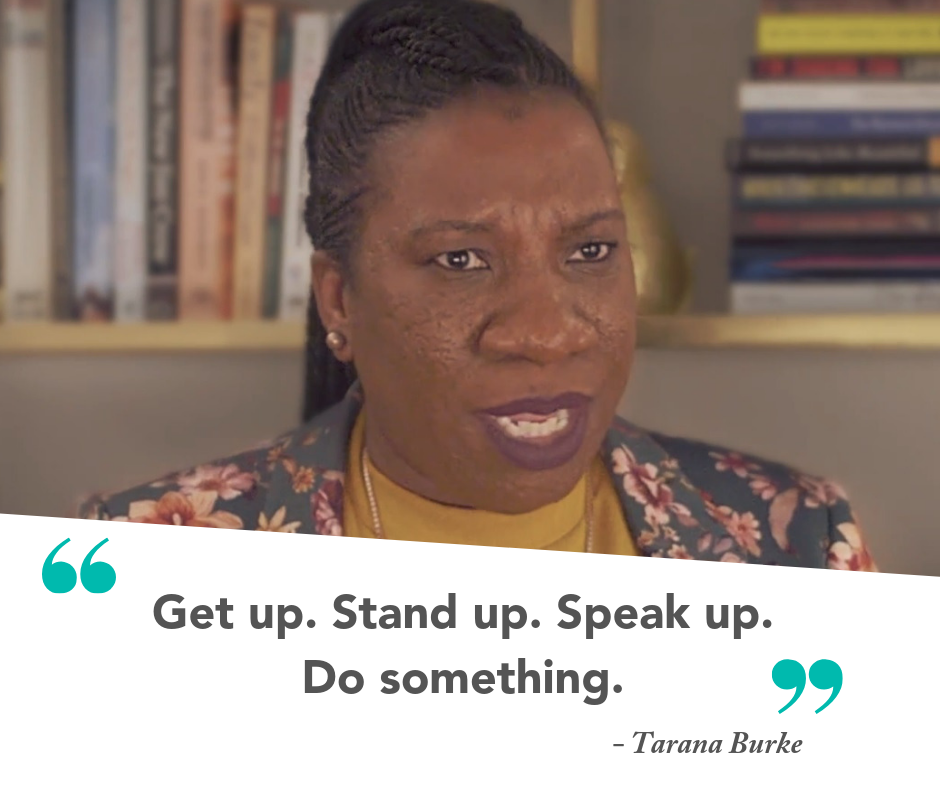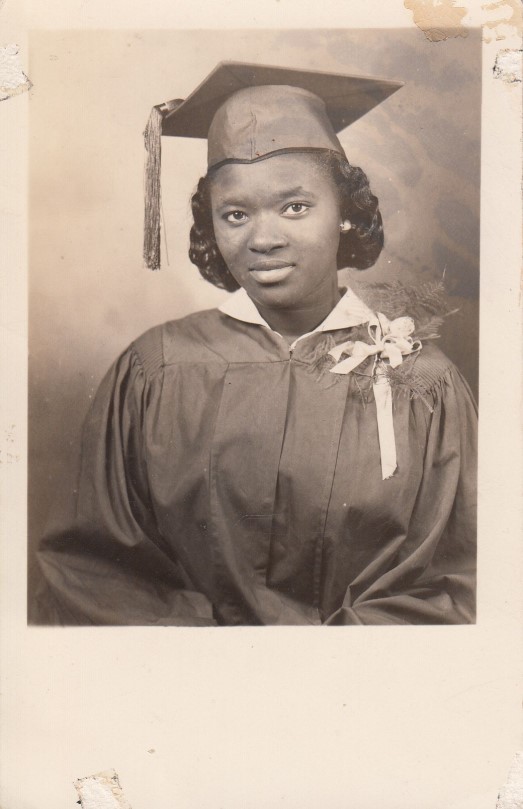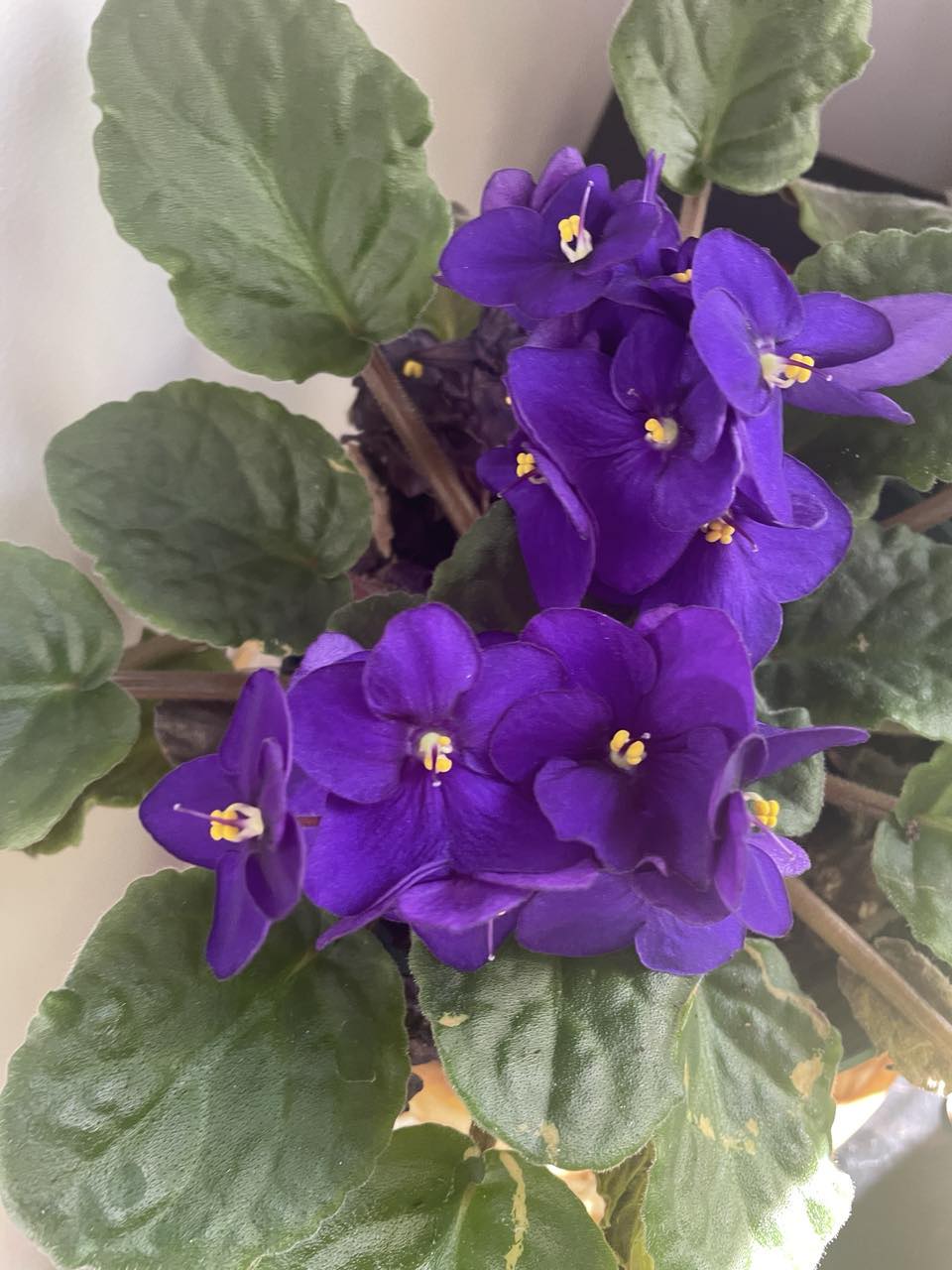“Domestic and intimate partner violence always leaves its mark. Those of us, including me, who are lucky still have our lives. For some, the mark is a headstone.” Menah Pratt
A photo of Tarana Burke reminds us of our responsibility to do something! Today is #HumanRightsDay. It is the last day of 16 days of activism against Gender-Based Violence. It is an international United Nations campaign that began on November 25th and ends today, December 10.
According to unwomen.org, this campaign was started by the Women’s Global Leadership Institute in 1991. Its focus is the “prevention and elimination of violence against women and girls” by 2030. That is just seven short years away. Sadly, I don’t think this goal is attainable. Yet, we can and must continue to raise awareness, and more importantly, act.
According to their statistics, 736 million women – almost 1 in three, have been subjected to physical and/or sexual intimate partner violence, non-partner sexual violence, or both, at least once in their lives.
I am one of those 736 million women.
My first experience was in 1986. I was 18 years old, attending the University of Iowa as a first-year student. Naïve and searching for love, I met Scottie. Scottie was a chef, but he was also an ex-con, staying at a half-way house. As part of his parole, he was released to me and my apartment. Not fully understanding what I was getting myself into, I tried to navigate an increasingly paranoid boyfriend, who was at least 10 years older than me. One night, he attempted to hit me. The yelling and screaming led to the neighbor calling 911. The police arrived. Terrified and horrified, I was rescued by them.
Over the course of my college years, I would be the survivor of a gang rape and a date rape. I share more about these horrific experiences in Blackwildgirl: A Writer’s Journey to Take Back Her Superpower, (out April 2, 2024, available now for preorder on Amazon). My experiences with violence did not end then.
They continued after college. Even today, many years later, I still remember the fear of driving home from work and the anxiety of anticipating meeting Wrath and Anger and False Accusations at the door. I did not anticipate the beating. I know the embarrassment of violence, when we think as a woman of degrees, we should be exempt from violence, as if violence has a particular look and particular victim. I know the shame that can keep women from calling the police to report the violence. I know the confused thoughts of worrying about the publicity and our ego, and judgment of others. I know the humiliation, the degradation, and the trauma of abuse.
The trauma of that nightmare, like a powerpoint on repeat, plays again and again in my mind. The physical abuse is compounded by emotional, mental, and psychological scars. Those scars last longer than the physical ones.
I still have those scars. Those scars on my soul are like the scars from the hot water burn I suffered in 1986. It turned my foot a light brown, a distinctly different color tone from the darker brown of the rest of my foot. Domestic and intimate partner violence always leaves its mark. Those of us who are lucky, like me, still have our lives. For some, the mark is a headstone.
A dear colleague, Prof. Cheryl Matias, recently shared her experience on Facebook, and gave me permission to share her post. “It’s been years since beginning court proceedings to divorce a domestically violent abuser-one who refuses to take accountability despite court ordered permanent restraining orders and documented bruises, but today the judge sided with me and granted me a dissolution of marital status despite my abuser’s protest to keep me married to him for further control. I’m overjoyed to be free and ever grateful for all of you who have been by my kids’ and my side. I am a loving mom. I am a faithful believer. I’m a dope ass Motherscholar and a professor who fights for justice. And…I am a survivor of domestic violence. For those who suffer DV please get out before he kills. #nomore #domesticviolence #domesticviolencesurvivor #fighter #alleluia #praisethelord #freeatlast #freeatlastfreeatlastthankgodalmightyimfreeatlast #changingmystatus #beschristmasgiftever #freedom #survivor #faithful #godhasmyback #speakingout #NoMoreSilence #womensrights #heaintworthit #weshouldnotbeashamedfprwhattheydo”
I understand these hashtags. We need to add another one: #GetOutBeforeHeKills. I have been horrified and saddened by headlines over the past few months.
- Natasha Billings was found dead after a welfare check, presumed to be a victim of domestic violence, per the Black Femicide Prevention Coalition. https://www.fox5atlanta.com/news/man-arrested-in-decatur-for-oct-30-death-of-woman-in-social-circle
- Shakeira Rucker’s body was found inside a self-storage locker, presumed to be a victim of domestic violence.https://www.cnn.com/2023/12/02/us/cory-hill-shakeira-rucker-murder/index.html
- Margaret Mbitu’s body was found dead in a vehicle in an airport parking lot, and the man suspected of killing her boarded a flight to Kenya, police said. https://www.usatoday.com/story/news/nation/2023/11/03/margaret-mbitu-death-boston-logan-kevin-kangethe-sought/71438508007/
- A heading from an Australian newspaper on October 28, 2023: ‘Not taken seriously enough’: 55 Australian women have been killed in 43 weeks.” https://www.news.com.au/lifestyle/real-life/news-life/not-taken-seriously-enough-55-australian-women-have-been-killed-in-43-weeks/news-story/e81aa9cb3b73171226ad34dcc22a734e
- This was followed by a November 24 article reporting on the murders of four South Australian women in one week, victims of domestic and family violence. https://www.theguardian.com/australia-news/2023/nov/24/south-australia-deaths-women-domestic-violence-rally-parliament-house-royal-commission
On Wednesday 15 November, a woman’s body was found inside a home in Felixtow. On 21 November, they arrested a 50-year-old man and charged him with murder. “The accused is known to the victim,” police said.
On Thursday 16 November, police and paramedics tried to resuscitate a 45-year-old woman in Davenport, but she died. A 53-year-old man was arrested and charged with murder. “The woman and the man were known to each other,” police said.
On Sunday, police found a woman, 39, dead at Encounter Bay. A man “who was known to the woman” was arrested and charged with murder, police said.
Jodie Jewell, 55, was murdered at the Modbury North home she shared with husband Kevin Jewell, also 55. On Thursday, police found the body of Kevin Jewell on the Yorke Peninsula.
- These women were different from the five women that were killed in 10 days in October.
- Blacksburg, Virginia, where I live and work at Virginia Tech, was the scene of another act of violence. A high school senior was killed by her former boyfriend, who then killed himself. https://roanoke.com/news/local/crime-courts/serenity-hawley-dating-violence-blacksburg-shooting-murder-suicide/article_98f5b67c-7f33-11ee-ac03-aba88cd3b26f.html
- Recently, I learned about Prof. Jeannine Skinner, a professor of gerontology. Her boyfriend of two months stabbed her more than 200 times, an autopsy revealed in November, 2017 https://www.charlotteobserver.com/news/local/crime/article208668749.html#storylink=cpy
What is even more devastating is that when we try to fight back so that we are not killed, we are often imprisoned for trying to protect ourselves. The statistics are staggering: “Almost six out of 10 women in prison and under community supervision are victims of domestic abuse, according to a new study published this week. “ https://www.thejusticegap.com/six-out-out-of-10-women-in-prison-are-victims-of-domestic-abuse-says-new-report/
Nicole “Nikki” Addimando is just one example. She was sentenced to 19 years to life in prison for killing her abuser in self-defense. As Nikki said at her sentencing: ““I wish more than anything it ended another way. I wouldn’t be in this courtroom right now, but I wouldn’t be alive either. This is why women don’t leave. They so often end up dead or where I’m standing — alive, but not free.”
So, what do we do about this? What can and should we do? I believe that domestic violence is connected to a male dominated patriarchal mindset that suggests that men can and should dominate women.
I’ve recently written that it is time for women warriors. https://menahpratt.com/its-time-for-women-warriors-in-the-world-lessons-from-africa-about-life-and-leadership/
There are actions we can take. There are many resources available. We must educate ourselves, and most importantly, after education, we must act.
I am encouraged and inspired by the fierce leadership and advocacy of one woman, who represents a woman warrior. Chief Theresa Kachindamoto.

“Theresa Kachindamoto didn’ t expect to become one of Malawi’ s Senior Chiefs. She’ s the youngest of 12 siblings and a mother of 5. But she also has chieftain blood. Theresa was content, living in the small city of Zomba and working as a secretary at the local college. Then one day she was told to pack her bags and come home to Monkey Bay – she’ d been made Senior Chief of Dedza District.
. https://www.vitalvoices.org/honoree/chief-theresa-kachindamoto/
She wore traditional red robes and set out to meet her people. Dedza District sits between Mozambique and Lake Malawi. It’ s home to 900,000 people and the average family lives on $11 a month. In Malawi, half the population lives under the poverty line. The country also has one of the highest child marriage rates in the world: 1 in 2 girls is married by 18. For poor families, early marriage is a way to ease their economic burden. It’ s also a custom that many cling to as a cultural rite.
In those first days, Chief Kachindamoto met countless girls who were also wives and mothers. Most had dropped out of school. They told her that some girls are beaten by their husbands and others die giving birth. “I said: no, this is too much. I must do something,” said Kachindamoto.
She summoned village headmen, church leaders and NGOs. “I told them: whether you like it or not, I want these marriages to be terminated.” She mandated that all village headmen sign and enforce an agreement to abolish child marriage and annul existing marriages. Anyone refusing to comply would be stripped of his position. And the chief kept her word. She dismissed 7 village headmen, 2 of whom were women, when they wouldn’t comply. When they returned to say they’d annulled all child marriages, she gave back their titles.”
Known as the Terminator, she created an intelligence network, known as “The Mothers’ Group.” This group is charged with monitoring activities across 545 villages. https://www.shethepeople.tv/top-stories/inspiration/theresa-kachindamoto-saved-3500-child-brides/
She is also outlawing initiation camps. In her village, when a girl gets her period, they are taken to initiation camps where they are taught how to please a man sexually, and then they are blindfolded, and taken to the hyena man who has sex with them to break their virginity. https://africa.cgtn.com/faces-of-africa-chief-theresa-let-girls-be-girls-2/
In 16 years of her reign, she has rescued almost 3,500 child brides and helped them to restart their education. She is promoting both the abolition of child marriages and education:
“In Malawi, almost 46% of girls leave school before age nine, mostly due to early marriage and teen pregnancy. In order to break the circle, Kachindamoto believes that continuing girls’ education is of utmost importance.”
https://www.shethepeople.tv/top-stories/inspiration/theresa-kachindamoto-saved-3500-child-brides/
She has a bigger and grander vision of changing the culture:
“Changing attitudes and behaviours takes time, particularly with male chiefs and parents who benefit from child marriages. As we speak, parents are withdrawing their girls from schools. I tell them, if you educate your girl, you will have everything in the future. I have made it my life’s mission to end the practice of child marriage. I’m now fighting to raise the legal age for marriage to 21 so that the girls will finish school. It’s my dream to have college scholarships to empower girls to fulfill their potential.”
She advocated for the Malawi government to change the legal age of marriage to 18, and now she is pushing for 21.
“If girls are educated, they can be and have whatever they want.”
https://www.vitalvoices.org/honoree/chief-theresa-kachindamoto/
Learn more about this amazing woman and the power of leadership through these two videos:
Ep 1: Chief Kachindamoto | COURAGE TO QUESTION
We have to do more. It is time to educate ourselves and act. #HUMANRIGHTSDAY
Tarana Burke and Alyssa Milano, along with so many others, used their voices, their experiences and #powertoempower an international phenomenon that has emboldened survivors and demonstrated the impact sexual violence has on so many.
If you are a #survivor, I send you grace and blessings.
If you are in an abusive relationship, I send you compassion and courage.
If you are an advocate, I send you strength and persistence.
To learn about my journey, pre-order Blackwildgirl and the Companion Journal on Amazon.
https://www.amazon.com/Blackwildgirl-Companion-Journal-Finding-Superpower/dp/1647427134
#nomore #domesticviolence #domesticviolencesurvivor #freedom #survivor #speakingout #NoMoreSilence #womensrights








